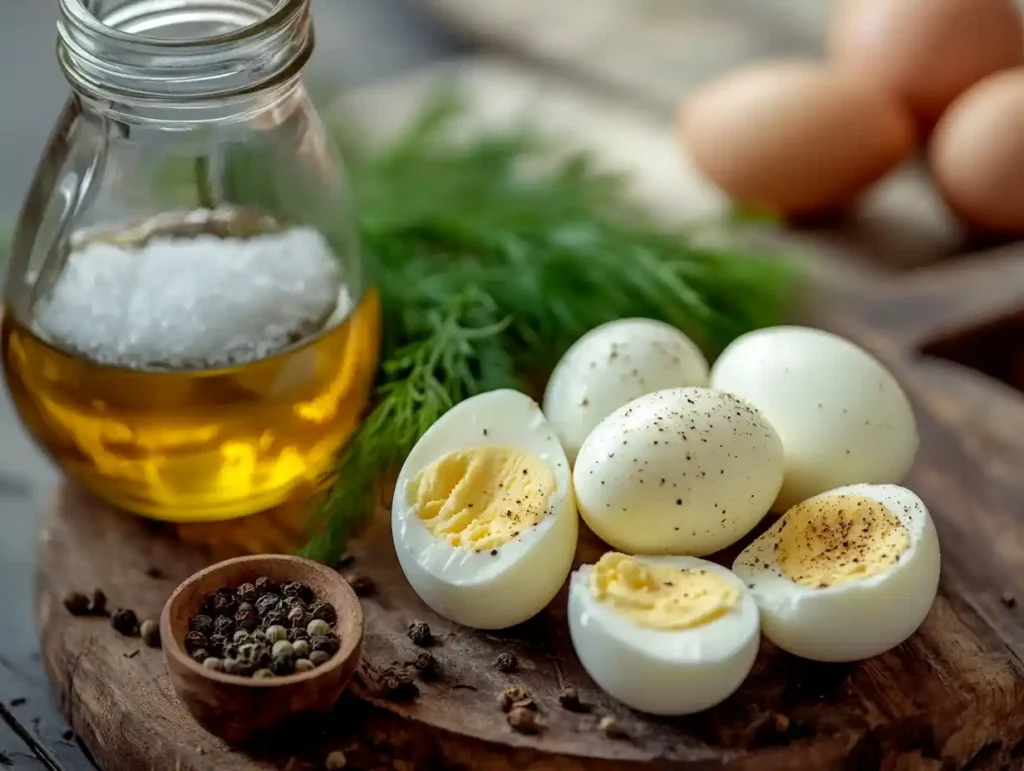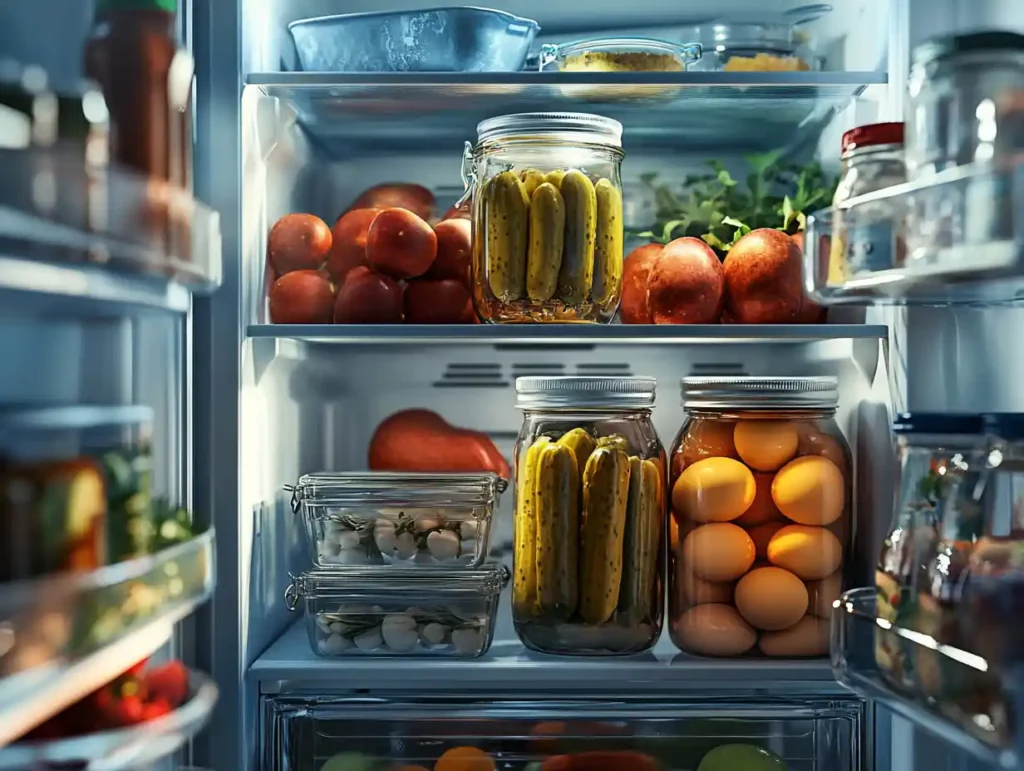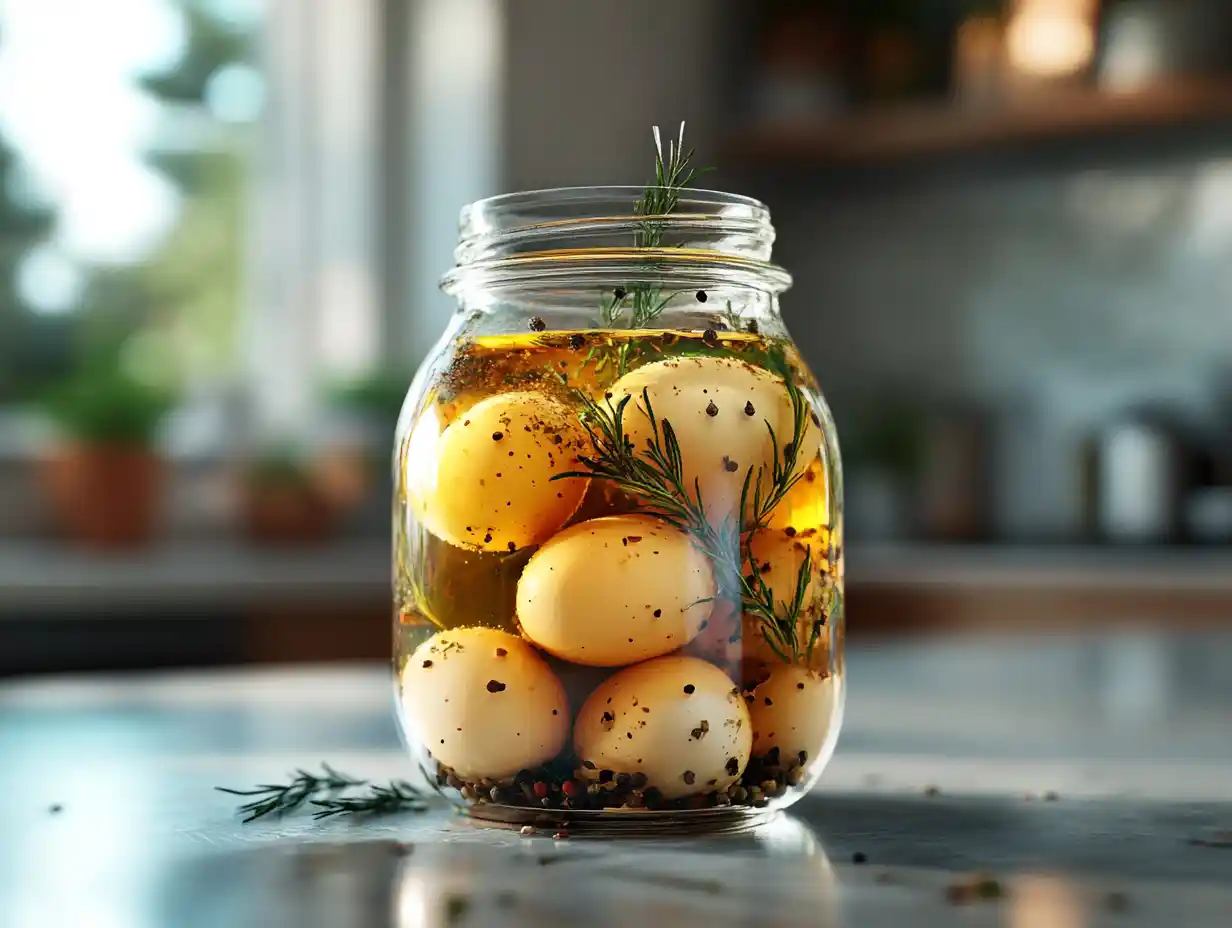Pickled eggs are a delightful and versatile snack, celebrated for their tangy flavor and extended shelf life. Immersed in a brine solution rich in vinegar, they are preserved for months, making them a favorite for food enthusiasts and preservationists alike. But how long do they truly last? Whether you’re a fan of homemade recipes or store-bought versions, understanding the longevity of pickled eggs is essential to ensure both flavor and safety.
In this article, we’ll explore the factors that influence how long pickled eggs last in vinegar, delve into the science behind pickling, and provide practical tips for safe storage and consumption. Let’s unravel the mysteries of this classic culinary treat.
Understanding Pickled Eggs

What Are Pickled Eggs?
Pickled eggs are hard-boiled eggs that are soaked in a mix of vinegar, water, salt, and sometimes sugar or spices. This method started as a way to keep eggs fresh before refrigerators were common. Today, many people enjoy them as a tasty snack or as part of salads and other dishes.
To make pickled eggs, you boil the eggs, peel them, and place them in a jar filled with the vinegar mixture. The vinegar not only keeps the eggs from spoiling but also gives them their sharp, tangy flavor. Adding spices or herbs can give the eggs even more flavor.
The Role of Vinegar in Preservation
Vinegar is the main ingredient that keeps pickled eggs fresh. Its strong acidity stops bacteria, mold, and yeast from growing. This makes the eggs last longer and taste tangy. Most people use white vinegar for its mild taste, but other types, like apple cider or malt vinegar, can add different flavors to the eggs.
Historical and Cultural Context
Pickled eggs have been around for hundreds of years and are enjoyed in many cultures. In Germany, they are a common dish, and in parts of America, they are popular snacks in bars and diners. Before refrigerators, pickling was one of the easiest ways to store extra eggs during the months when hens laid fewer eggs.
The Science Behind Pickling
How Pickling Preserves Food
Pickling works by mixing vinegar, salt, and sometimes sugar to create a brine. The vinegar makes the mixture sour, which stops bacteria and other harmful germs from growing. Salt helps by drawing out moisture, making it harder for bacteria to survive. Together, these ingredients keep pickled eggs fresh and safe to eat for a long time.
Factors That Affect Shelf Life
Several factors influence the shelf life of pickled eggs:
Egg Quality: Fresher eggs result in better texture and longer-lasting preservation.
Refrigeration: Storing pickled eggs in the refrigerator helps them last longer.
Brine Strength: A stronger vinegar concentration in the brine offers better preservation.
Hygiene Practices: Sterilizing jars and utensils reduces the risk of contamination.
Safety Standards for Homemade Pickled Eggs
When preparing pickled eggs at home, safety is essential to ensure they remain fresh and free from harmful bacteria. Start with fresh, high-quality eggs and boil them thoroughly before peeling. Use a trusted recipe that includes enough vinegar, typically with at least 5% acidity, to create a brine that effectively prevents the growth of bacteria.
Sterilize the jars and lids before adding the eggs to eliminate any risk of contamination. Wash the jars with hot, soapy water and sterilize them in boiling water for 10 minutes. Once filled, ensure the eggs are fully submerged in the brine to prevent exposure to air, which can cause spoilage.
Always store homemade pickled eggs in the refrigerator at a temperature below 40°F (4°C). Label the jars with the preparation date, and consume the eggs within 3-4 months for the best flavor and safety. By following these steps, you can enjoy your pickled eggs worry-free.
Shelf Life of Pickled Eggs in Vinegar

How Long Do Pickled Eggs Last When Refrigerated?
When kept in the fridge, pickled eggs can last up to 3 or 4 months. The vinegar in the brine keeps them from spoiling, and the cold temperature helps too. After this time, the eggs may still be safe, but their taste and texture might not be as good. Adding a label with the date of preparation can help you keep track of how long they’ve been in the fridge.
Shelf Life at Room Temperature
It’s not safe to store pickled eggs at room temperature. Harmful bacteria, like Clostridium botulinum, can grow in warm conditions. Store-bought pickled eggs might be processed to last longer without refrigeration, but homemade ones should always be kept cold to avoid risks.
How to Tell If Pickled Eggs Have Gone Bad
You can identify spoiled pickled eggs by watching for these warning signs:
Mold or Discoloration: Mold growth or unusual color changes signal that the eggs are unsafe to eat.
Unpleasant Smell: A sour or rotten odor strongly indicates spoilage.
Cloudy Brine: While slight cloudiness might occur naturally, heavy clouding often points to contamination.
Best Practices for Storing Pickled Eggs
Proper Jar Sterilization
Sterilizing jars is a key step when making pickled eggs at home. Clean jars help prevent bacteria from growing and spoiling the eggs. To sterilize jars, wash them in hot, soapy water and rinse thoroughly. Then, place the jars in boiling water for 10 minutes or run them through a hot cycle in the dishwasher. Allow the jars to dry completely before adding the eggs and brine.
Using clean lids is also important. Check for cracks or dents, as these can allow air or bacteria to enter the jar and spoil the contents.
Tips for Extending Shelf Life
To help your pickled eggs stay fresh and tasty for as long as possible, follow these tips:
- Keep the Eggs Fully Submerged: Make sure the eggs are completely covered in brine to stop air from spoiling them.
- Store in the Fridge: Always keep pickled eggs cold. Even if the brine is acidic, refrigeration provides an extra layer of safety.
- Avoid Double-Dipping: Use clean utensils when removing eggs from the jar to prevent contamination.
- Shake the Jar Occasionally: Gently shaking the jar every week helps distribute the brine evenly, ensuring all eggs soak in the flavors.
Recommended Storage Conditions
Proper storage is essential to ensure your pickled eggs stay fresh and safe to eat. Always keep pickled eggs in the refrigerator at a consistent temperature below 40°F (4°C). This cold environment helps maintain the eggs’ quality by slowing the growth of any bacteria. Place the jar in a cool section of the fridge, away from direct exposure to warm air when the door is opened. Ensure the jar remains tightly sealed to prevent air from getting in, which could spoil the eggs or make the brine cloudy.
For the best flavor and texture, consume pickled eggs within 3 to 4 months of preparation. Label the jar with the date you made the eggs to track how long they have been stored. If you open the jar, finish the contents within a few weeks, as exposure to air can speed up spoilage. Avoid placing the jar near strong-smelling foods in the fridge, as the eggs may absorb odors. By following these storage practices, you can enjoy your pickled eggs at their best for an extended period.
Common Questions About Pickled Eggs
Do Different Vinegars Affect Shelf Life?
Yes, the type of vinegar can slightly impact shelf life. White vinegar is often the most effective for preservation because of its high acidity and neutral taste. Apple cider vinegar or malt vinegar can still preserve eggs but may have slightly lower acidity levels, which could shorten shelf life.
Can You Reuse Pickling Brine?
While it might be tempting to reuse leftover brine, it’s not recommended. The brine absorbs some of the egg’s moisture and proteins during pickling, which can lower its acidity. This reduces its ability to preserve and keep food safe. For best results, prepare a fresh batch of brine each time.
What Happens If Eggs Are Not Fully Submerged in Vinegar?
When eggs aren’t fully covered in brine, the exposed parts are at risk of spoilage. Air promotes the growth of mold and bacteria, which can make the eggs unsafe to eat. Always ensure the eggs remain fully submerged to keep them fresh.
Are Store-Bought Pickled Eggs More Shelf-Stable?
Store-bought pickled eggs often undergo special processing, such as pasteurization, which makes them more shelf-stable. Manufacturers may also use preservatives to extend their shelf life. However, once opened, they should still be refrigerated and eaten within a few weeks.
What Are the Risks of Eating Expired Pickled Eggs?
Eating expired pickled eggs can lead to foodborne illnesses caused by harmful bacteria like salmonella or botulism. Symptoms can include stomach cramps, nausea, vomiting, and fever. To avoid these risks, check for signs of spoilage before consuming pickled eggs and discard them if in doubt.
How Do Flavors Evolve Over Time in Pickled Eggs?
The flavors in pickled eggs change the longer they sit in the brine. After about 2-4 weeks, the eggs absorb the vinegar and spices, resulting in a more pronounced taste. Over time, the brine’s flavors intensify, which can make the eggs tangier and spicier. However, waiting too long may cause the texture to become rubbery.
Conclusion
Pickled eggs are a timeless and versatile treat, offering both a long shelf life and a burst of tangy flavor. With proper preparation and storage, they can last for months while maintaining their taste and texture. Always use a high-quality brine with the right acidity, sterilize your jars, and store the eggs in a refrigerator to ensure safety. Regularly check for signs of spoilage, such as changes in smell, color, or brine clarity, to avoid any health risks.
Experimenting with different vinegars, spices, and herbs can create unique flavor profiles, making pickled eggs a delightful addition to your pantry. Whether you enjoy them as a snack, in salads, or as part of a larger meal, they are a convenient and tasty option for preserving eggs. By following the guidelines in this article, you can confidently prepare and store your pickled eggs while ensuring they are safe and delicious. So, get creative, try new recipes, and enjoy the many possibilities of pickling!
For more tips on pickling and food preservation, explore our easy Spicy Pickled Eggs Recipe. You might also enjoy discovering What Makes Claussen Pickles Different or try our delicious Claussen-Style Dill Pickle Recipe to enhance your pantry staples. Happy pickling!

